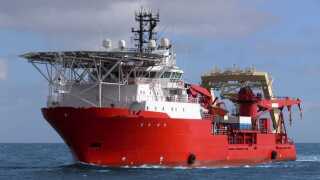The guests for the podcast are:
Ben Roberts, CTO Liquid Technologies
Chris Wood, CEO, WIOCC Group
Rhys Morgan, VP - General Manager, EMEA media and networks sales, Intelsat
You can listen to the full discussion here:
Wood began the podcast by saying that over the last five or six days since the cuts in West Africa, there has been a serious impact on the internet.
"We've had field teams working in data centres both in Africa and also in Europe to patch through and restore the bulk of the capacity onto other systems," he told Capacity.
In turn, WIOCC has restored up to two and a half terabits of capacity both North and South out of Lagos on the Equiano Cable System.
"We've had engineers working pretty much 20 hours a day for five days and over that period, they've restored, I think over 30 client networks, ISPs and major telcos in Nigeria with nailed up over 100 circuits, both North and South out of Lagos and also tripled the capacity in our IP backbone. And that's required us to source optics and cards from our suppliers at short notice."
Roberts sent a tweet on March 14, listing all of the cables affected by the cuts. He sent that at a time when confirmation of what exactly happened to the cables was still unknown.
"We are using most of our capacity and our IP network. We have automatic failover, so we don't have to do so much running around as Chris has described," he said.
"But we did have some customers we had to move over, and we also brought some of that East Coast capacity online. We know that some of these repairs take a long time, so even when we have backup and redundancy, something fails. We know we need to restore that in case something else fails."
Roberts maintained that Liquid was "in pretty good stead" when the four cables went down at the same time in East Africa and West Africa.
He believes communicating with customers was extremely important throughout the process, and the company has been bringing more people onto its IP network which has already received some backup.
Roberts notes that this isn't the first time we've seen an issue like this. In 2014 there were multiple cable cuts, resulting in some "big events" in East Africa.
"It meant we redesigned the way we run our networks completely and we applied that same design in our West Africa networks. So, we're not so badly affected, and alternately, it's about not just connecting Africa to Europe but connecting Africa back to the other peering points in Africa."
Capacity last spoke to Morgan on March 5 – where he noted that satellites were being used to mitigate Red Sea cable cuts.
And Morgan was keen to emphasise that satellite was always going to be complementary to fibre.
"Chris mentioned several terabytes of traffic being restored. Now, we're not going to do that on a satellite system with all the best technology in the world, but we are complementary. Ben talked about network design, and we would always encourage customers to think of a hybrid approach."
So during the cable cuts, Morgan says Intelsat put together a couple of trunking services for customers who were experiencing some issues. But now with the cuts on the West Coast of Africa predominantly, there has been a tremendous uptick in discussions.
"We've had people on planes, had equipment on planes and we're putting up links in a number of places across West Africa now.
"For the moment, those links are international, so either from our facilities in Europe or the US into West Africa to provide some international connectivity. We've spent time developing domestic networks as well across a number of countries. And what we're doing as well is looking at how we can expand on those.
You can now listen to all of the podcasts from the Capacity Team on Spotify!





